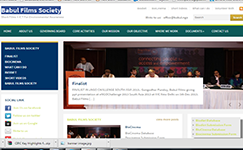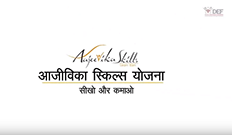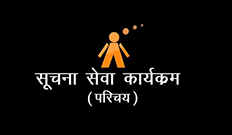
Dear Readers,
The October-November issue of our newsletter is now in your hands. You will notice that over the last few months we have been tinkering with our website and our newsletter to make them increasingly more reader-friendly, more informative and more interesting. In this issue you will notice that we have slightly restructured our presentation to give you reader-friendly updates on the work we have done, since the publication of our last newsletter, in each of our seven major programmatic work areas: Research & Advocacy, Knowledge Network & Database, Markets & Enterprise, Social Sector & CSOs, Education & Empowerment, Access & Infrastructure and Governance & Citizen Services.
We believe that the work we do is fully aligned with both national and international mandates with regard to empowering people with digital tools, digital skills and broadband access to the Internet, the information super highway. This newsletter brings to you exclusive stories not reported in mainstream media or anywhere else that we hope will justify our belief.
To start with, our Highlight of the Month brings you a report on the 12th edition of the Manthan Awards held at India Habitat Centre, New Delhi, on December 2, 2015. Arguably one of the most coveted awards in the world for digital practitioners, this year's award saw 36 digital innovators across South Asia and the Asia Pacific region being felicitated. The report tells you in brief about the proceedings during this year's Award Gala event.
This time DEF also launched for the first time the CIRC Award which seeks to honour those centres doing great work on the ground. While one of the centres was declared a Model centre, three other centres were rewarded under three different categories. See our brief report later in this newsletter.
We then give you reports on each of our seven programmatic areas. In our reports on the Research and Advocacy programmatic area, we bring you two reports: in collaboration with the global civil society organisation Association for Progressive Communications (APC), DEF's Internet Rights team has prepared a country report on the state of Internet Freedom in India, 2014, to be published on 10th December, 2015. In another report, we inform you about a compilation of 14 case studies that DEF is preparing for the UNICEF on how mobiles are bringing about social and behavioural changes in India.
In the two programmatic areas of Knowledge Network and Database and Markets & Enterprise, we offer you one report for each of the areas.The first report is on our workshops to enhance awareness of the usefulness of social media in Tier II and III towns in India. The second report is about how we are helping the weavers of Chanderi to boost their sales in the festival season.
In the Social Sector & CSOs programmatic area, we provide two reports: the first on how our eNGO programme is empowering NGOs through training and digital literacy workshops and the second one on our e-Heritage website that we have enriched and upgraded in several ways.

Then follows several reports on two of our remaining programmatic areas – Access & Infrastructure and Governance & Citizen Services In several ways these are our primary thrust areas in empowering people at the edge of information. Each of these reports, available only here and hardly ever reported in mainstream media will tell you how DEF is at the vanguard of the digital revolution in India.
Take for example, our short report on the launch of a CIRC at Nichalagarh, Rajasthan. Till last November, the people of the village could not even use mobile phones. Now thanks to wireless connectivity provided by DEF, this remote village has broadband connectivity.
We sincerely hope you find this newsletter informative and interesting. Please let us know your feedback, criticisms and suggestions.
Let us not hold you back any further. Go ahead, read this newsletter and know about unheard of stories of how digital empowerment is transforming lives!
Happy Reading !
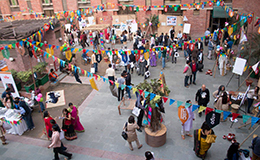
The 12th edition of the Manthan Award South Asia and Asia Pacific Gala was held in an all-new 'unconference' style at India Habitat Centre, New Delhi, on December 2, 2015. This year, the Awards felicitated 36 digital innovators shortlisted out of 412 nominations received from 36 countries in South Asia and the Asia Pacific region. There were 27 Winners, eight Special Mentions and one Jurors' Mention across 13 categories.
Over the years, the Manthan Awards has grown in scope and stature and, today, it is one of the most coveted awards for digital practitioners in this part of the world. The event began at 3 pm with more than 450 participants, speakers, delegates and award finalists — from all over South Asia and Asia Pacific region — registering at Charminar. In keeping with the style of the event, Charminar and the area around it was decorated in a village-theme, complete with hawker carts, well, charpoi, bamboo sticks, hay stacks and much more.
Soon after the registration, various activities centred around ‘Digital Exclusion’ were kick-started with 57 innovators (or Finalists) who enjoyed brainstorming and networking with several thought leaders from the development, corporate and government sectors. The ‘Digital Exclusion’ activities gave the Finalists, from across 13 categories, an opportunity to conceptualise and analyse their respective ICT-based solutions on stage.
The activities were followed by high tea, a Rajasthani folk musical performance by a group of bhapang (an ancient musical instrument) players and a stage play — conceptualised, scripted and enacted by DEF employees — that paid a tribute to our beloved Motilal Ji who had been an inspiration for DEF to mobilise tribal communities in Rajasthan and make them digitally literate. Read More


Report on Internet Freedom in India launched on December 10, 2015
Digital Empowerment Foundation (DEF) launched its country research report titled 'Limited Access Restricting Expression' at the YMCA, New Delhi, on December 10, 2015. The launch was followed by a multi-stakeholder consultation on ‘Understanding the Freedom of Expression Online & Offline’. The consultation sought to bring together representatives from various human rights organisations, Internet-advocacy NGOs and government representatives working in India. The report is the outcome of the first year of the IMPACT Project, funded by APC and supported by the European Union. Read more
Documenting mobile apps for education and health in rural India
A Research & Advocacy team visited seven districts in Madhya Pradesh and one in Karnataka to conduct surveys under the Mobiles for Social & Behavioural Change project, implemented in partnership with UNICEF. The sites visited comprised innovations in school infrastructure tracking, monitoring for ethical medical practices and tablet-based child nutrition monitoring systems in villages. The aim of this project is to bring about a measurable positive change in social perceptions with regard to empowerment, health and education. The report, with quantitative and qualitative analysis of 14 case studies, will be released in December end.
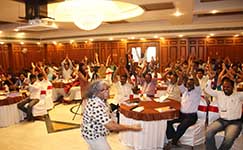
Workshops spread awareness of social media
DEF organises the annual Social Media for Empowerment South Asia as part of its Knowledge Network & Database programmatic area. This next award function is scheduled for March 2016 and is in collaboration with the Friedrich Naumann Foundation under which DEF also has to organise a series of workshops to spread awareness about how people in Tier II and III cities, and tell them how they can harness the power of social media as a tool for promotion, networking and marketing to capture available opportunities. Two such workshops were organised in Chamba and Pondicherry in November. Read more

Diwali boosts Chanderiyaan sales
Chanderiyaan, the e-Commerce outlet developed by DEF to empower the renowned but impoverished weavers of Chanderi, Madhya Pradesh, saw a big boost in pre-Diwali sales in November. Till 2010, these weavers were at the mercy of middlemen and somehow eked out a living. With DEF's comprehensive digital intervention, they have now tripled their monthly incomes. On November 9, 2015, DEF organised an in-house exhibition to enable the staff and their friends and family to go on a pre-Diwali shopping spree for exquisite Chanderi sarees, stoles, dupattas and kurtas. Read more
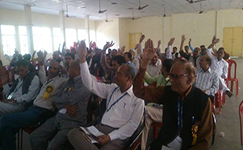
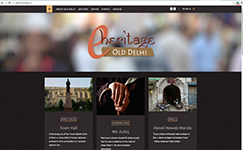
e-NGO digital literacy training in Hardoi, Uttar Pradesh
DEF in collaboration with its local partner Adarsh Convent Samiti organised a full-day workshop on 17 November 2015 in Hardoi, Uttar Pradesh, as part of its e-NGO programme to enhance digital skills of NGOs. The workshop was highly interactive and raised some important questions, which were answered by the DEF team. Some 50 participants from varioud NGOs and NPOs gathered to learn and gain awareness about the importance of using digital tools such as email, website, and social media tools. A similar workshop was organised in Yashada, Pune, on December 1, 2015.
e-Heritage website re-launched with delightful video stories
November saw the re-launch of the e-Heritage website with richer text and delightful video stories. The website is regularly updated and we welcome new ideas and elements for further enriching it. The month also marked the end of the e-Heritage Project Fellowship 2015, under which four Fellows were given an opportunity to visit Old Delhi and research on various sites and topics of heritage importance. The immensely successful programme saw young researchers submitting interesting and extensively researched stories on the lives of Begum Samru and Dara Shikho, the art of Daastangoi and the myths about Jama Masjid.
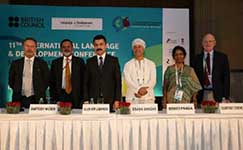
DEF knowledge partner at global meet on language preservation
DEF was the knowledge partner at the 11th International Language and Development Conference hosted by the British Council in Delhi from November 18-20. The theme for this year’s conference was 'Multilinguism and Development', and India was considered the perfect host country as it is one of the most multilingual countries with two official languages, 22 scheduled languages and over 700 other used by community or tribe. DEF Founder-Director Osama Manzar discussed the role of digital media in preserving languages and highlighted the importance of oral knowledge over its written form. Read more

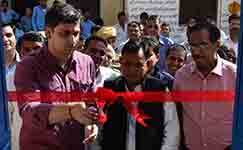

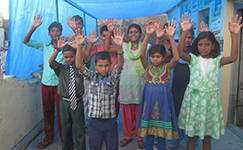
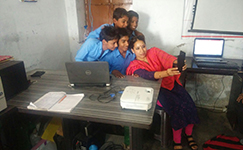

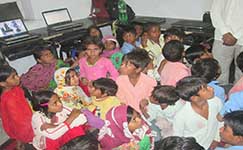
DEF launches first-ever CIRC Awards
DEF launched, for the first time, the CIRC Awards to recognise and honour those centres that show exemplary work at the grassroots level. The award event was held on December 2, 2015, to acknowledge those who contributed towards bringing positive transformation in rural and semi-urban communities of the country. The award celebrates outstanding feats in three categories: community outreach, programme diversity and enterprise & sustainability. CIRCs at Anjaiah Nagar, Bhawan and Sonapur respectively were announced winners while CIRC Chandauli was felicitated as a Model centre.
CIRCs inaugurated in Nichalagarh and Bengaluru
In a major achievement, DEF opened a new centre at Nichalagarh vilage in the Abu Road sub-division of Sirohi district, Rajasthan, on November 20, 2015. Before the launch of the CIRC, the village had no mobile connectivity or any other telecommunication connectivity. Even by road, the village is inaccessible during monsoons. Now, DEF has digitally connected this remotest of the remote village with WiFi connectivity - a feat highly appreciated by the local Sub-divisional Magistrate Abichal Chaturvedi. One more CIRC was inaugurated in Bengaluru, Karnataka, on November 5, 2015, by Md. Yousuf, Chairman of Waqf Board, Karnataka.
RTI Week observed at various CIRCs across India
The RTI week was observed from October 12-19, 2015, with great fervor at various Community Information Resource Centres (CIRCs) and Digital CIRCs (dCIRCs) cross the country. An array of activities were conducted at these centres such as awareness workshops, poster-making competitions, essay writing and screening of educational films and videos, among other things. At some centres, people were also taught how to file an RTI. Following this, some RTIs were actually submitted in several district to obtain information about important questions pertaining to the respecte regions.
Children celebrated Global Handwashing Day
Global Handwashing Day was celebrated at various CIRCs on October 15, 2015. After learning the nine steps of healthy handwashing, children from villages Pakri and Mansoorpur, both in Bihar, queued up to follow those steps and flaunt their clean and unsoiled hands. Apart from raising the community's awareness about the benefits of washing hands with soap as a key approach to disease prevention, participants also learnt about how this basic personal hygiene measure can reduce child mortality, respiratory disorders and diarrheal diseases. The children were also asked to promote healthy lifestyle at their homes.
Sowmya Kidambi visits various centres of Alwar
On 16th October, 2015, Ms Sowmya Kidambi, Director, Society for Social Audit, Accountability and Transparency visited Bahadurpur and Chandauli CIRCs in Alwar district of Rajasthan. She was accompanied by DEF Founder-Director Osama Manzar. Besides interacting with students at the centres and allowing them to indulge in taking selfies, Ms Kidambi also visited a Residential Girls' School at Chandauli where she met cheerful students and ardent fans of CIRC. At both the centres, Kidambi learnt about the various ways broadband connectivity has proved to be transformatory for the rural communities.
Special farming workshop conducted in Halduchaur
Recently, a special farming workshop was organised at CIRC Halduchaur in Haldwani district of Uttarakhand on October 29, 2015, to educate the farmers and those involved in farming-relating activities about the new techniques that they can use on their farms to improve efficiency and boost productivity. The farming community was also encouraged to learn computers at the CIRC so that they can keep themselves updated on latest farming tools, equipment and techniques. The workshop was attended by a large group of audience who interacted with the presented and got several of their questions answered.
Village Rojaka Baas welcomes new CIRC
On October 30, 2015, a CIRC was inaugurated at village Rojaka Baas, Chandauli, in Alwar district of Rajasthan. The inauguration was thoroughly planned by the local CIRC staff and people of varying age groups participated in the event. The centre was inaugurated by Chief Guest Shri Kritan Dhawaria, School Principal, Govt. School Chandauli, who expressed great appreciation for the CIRC project and said that more such efforts should be made to empower underprivileged children and give them a bright future.
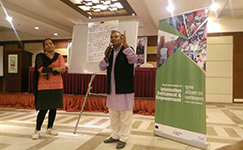
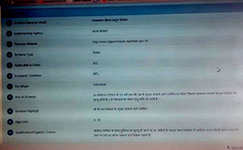
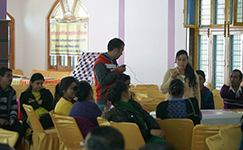
Barmer workshop raises awareness on government welfare schemes
On November 17, 2015, DEF in partnership with Zila Yuvak Kosh Samiti (ZYKS), a local non-profit, organised a district-level workshop at Barmer, Rajasthan, as part of its Soochna Seva project. The objective was to create awareness about various government schemes and how their benefits could reach the last mile beneficiaries. Elected members of gram panchayats, district/block officials, social activists, local influential NGOs, CBOs, self help group workers, primary health centre officials, bank officials and a few beneficiaries attended the workshop, which was a great success. Read more
ICT integration at Soochna Seva Kendras
ICT interface was integrated in Soochna Seva Kendras in Barmer region of Rajasthan on October 19; Tehri Garhwal in Uttarakhand on October 22; Ranchi in Jharkhand on October 24; Guna in Madhya Pradesh on October 27; and West Champaran in Bihar on October 29, 2015. The primary objective of the integration is to provide information about all government schemes to people, irrespective of their age and caste. This interface will act as a one-stop hub for information on schemes and other important data such as application forms, list of beneficiaries, etc. This integration is available in five districts but will soon expand further.
Tehri Garhwal workshop creates awareness
On November 19, 2015, DEF in partnership with Henvalvani, a local community radio station, organised a district-level workshop at Chamba region in Tehri Garhwal district of Uttarakhand. The workshop sought to build a deep conceptual understanding of public schemes, programmes and the procedure to avail teh same. The workshop also provided participants an opportunity to explore in depth the various areas that required dissemination of information on citizen entitlements. The chief guest of the day was Henvalvani community radio Station Manager Rajinder Negi. Read more
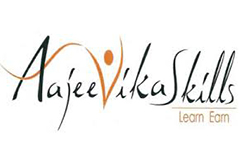
The Aajeevika-National Rural Livelihood Mission (NRLM) is an initiative launched by the Ministry of Rural Development (MoRD) udner the government of India in June 2011. The Aajeevika Skill Development Programme (ASDP) is a sub-mission under NRLM. It has evolved out of the need to cater to the occupational aspirations of the rural youth who are poor and to diversify incomes of the rural poor community. Read More
Established in 2012, Babul Films Society is a registered non-profit based out of Hyderabad. The organisation works to promote creation and production of socially relevant films that promote awareness of social issues, spread knowledge among the ignorant and push them towards action for their own betterment.
To know more about Babul Films Society, visit http://babul.ngo/
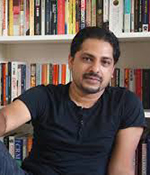
Recently, I had the opportunity to spend a couple of weeks in India. I was part of a conference series, Startup Capitals, that I was co-organising in New Delhi and Bengaluru in Karnataka. Then, I stopped over in Mumbai for a few days and met some more entrepreneurs. Most of the speakers in the conference pointed out that India is still weak in research and innovation. We have many doctorate holders but not many innovators. That’s something that needs to be changed, but why are Indians like that? What are the impediments Indians face as innovators? Read more
To stay updated with DEF Founder-Director's columns, featured this past month in Mint newspaper, click here
To follow DEF's coverage in media, click here
Click here to read interesting facts and figures from the digital world, published in collaboration with Mint newspaper.
